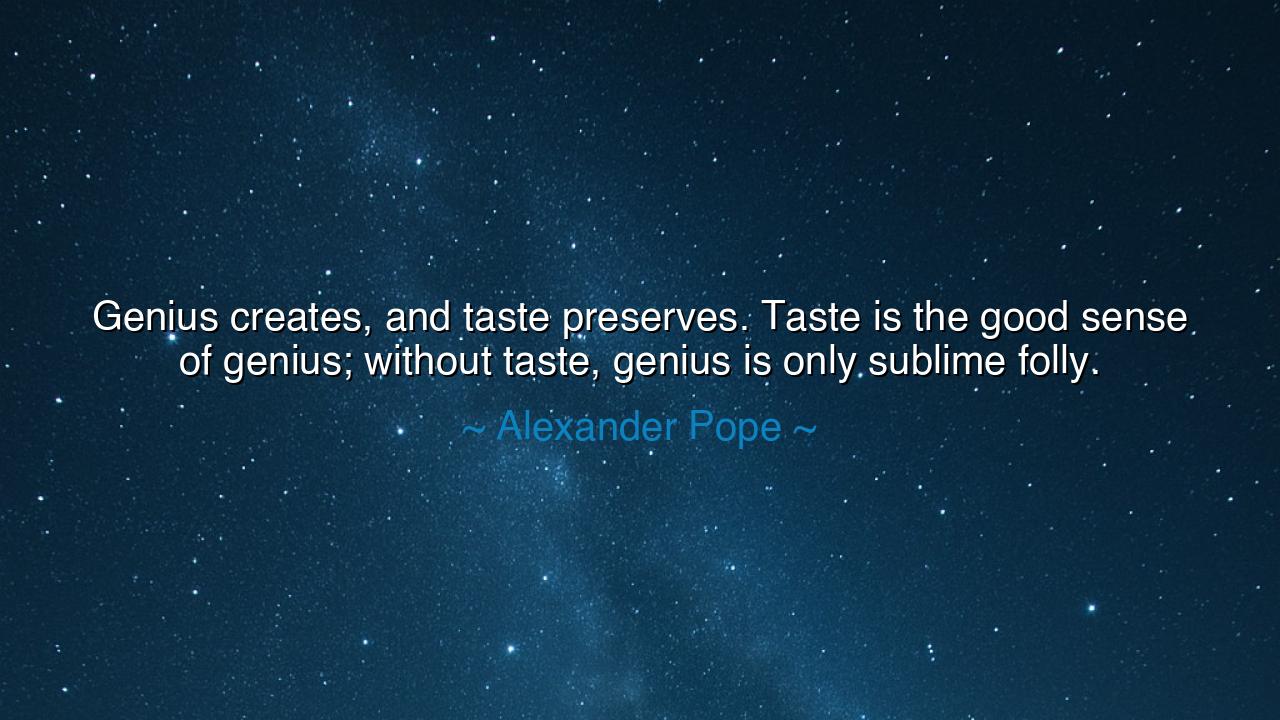
Genius creates, and taste preserves. Taste is the good sense of
Genius creates, and taste preserves. Taste is the good sense of genius; without taste, genius is only sublime folly.






“Genius creates, and taste preserves. Taste is the good sense of genius; without taste, genius is only sublime folly.” — so declared Alexander Pope, that master craftsman of the English tongue, whose pen united wit and wisdom into immortal verse. These words, drawn from the heart of the Enlightenment, carry a truth that resounds through the ages: that genius, magnificent as it is, must be guided by taste — by judgment, harmony, and restraint — or else it destroys itself in the fire of its own brilliance. For untempered genius burns; refined genius illuminates.
The origin of this saying lies in Pope’s lifelong devotion to order, beauty, and balance in art. Living in an age that worshiped reason yet revered imagination, he sought to reconcile the two. To him, genius was the divine spark — the power to see beyond the ordinary, to create what never was. But taste, he said, was the compass of that power — the moral and aesthetic sense that keeps creation aligned with truth, proportion, and humanity. Thus, he warned that when genius runs wild without taste to govern it, it becomes sublime folly — astonishing in vision, but unanchored, chaotic, and ultimately destructive.
Consider, for a moment, the image Pope paints: genius as a mighty river, surging with force and inspiration, and taste as the channel that guides its course. Without its banks, the river floods and ravages the land; with them, it nourishes and gives life. So too in art, science, and the conduct of life: imagination must be wedded to discernment. For taste is not the enemy of creativity — it is its guardian. It refines wild inspiration into beauty that endures. The truly great do not create merely to astonish; they create to reveal the eternal laws of harmony that dwell beneath all things.
History is filled with examples of this truth. Leonardo da Vinci, that towering figure of the Renaissance, embodied both genius and taste. His mind soared beyond the limits of his age — into flight, anatomy, light, and form — yet his creations remained grounded in exquisite balance and proportion. His “Last Supper” is not only a feat of imagination but of restraint; every gesture, every shadow, every line serves the greater unity. It is genius mastered by taste — divinity made visible through order. Compare this to the reckless prodigies who, though dazzling in invention, consumed themselves in excess, leaving behind fragments instead of legacies. Genius without taste, Pope reminds us, is not wisdom — it is madness wearing the mask of brilliance.
Taste, then, is not mere elegance or fashion; it is the inner measure of truth. It is the quiet wisdom that knows when to speak and when to be silent, when to add and when to refrain. It is the harmony of reason and feeling, of imagination and morality. The man of taste recognizes the boundaries between greatness and vanity, between the sublime and the absurd. He understands that beauty lies not in excess, but in proportion; not in indulgence, but in discipline. As the ancients said, measure is the mother of perfection.
Yet Pope’s words extend beyond art — they are a mirror for life itself. Every human being possesses some spark of genius — the creative power to shape their destiny. But without taste, that is, without good sense, humility, and self-control, this power can lead to ruin. The ambitious without discernment chase glory into folly; the visionary without patience builds castles in air. True greatness, in art and in living, requires both the fire to create and the wisdom to restrain. The balance of these two — genius and taste — is the foundation of all enduring excellence.
So, my listener, learn from Pope’s wisdom: create boldly, but judge wisely. Do not extinguish your fire in fear of excess, but do not let it consume all that surrounds you. Cultivate taste — through reflection, study, and humility. Read deeply, observe the world, listen to the quiet music of proportion and purpose. Let your creations — whether of art, thought, or deed — be guided not only by passion but by principle.
For in the end, genius without taste dazzles only for a moment, like lightning across the sky — brilliant, but fleeting. Yet genius wedded to taste endures like the sun — steady, radiant, life-giving. This is the union Pope calls us to: to let imagination rise, but wisdom steer; to create beauty not for vanity, but for truth. For it is only when the heart of genius beats in harmony with the soul of taste that humanity approaches the divine.






AAdministratorAdministrator
Welcome, honored guests. Please leave a comment, we will respond soon